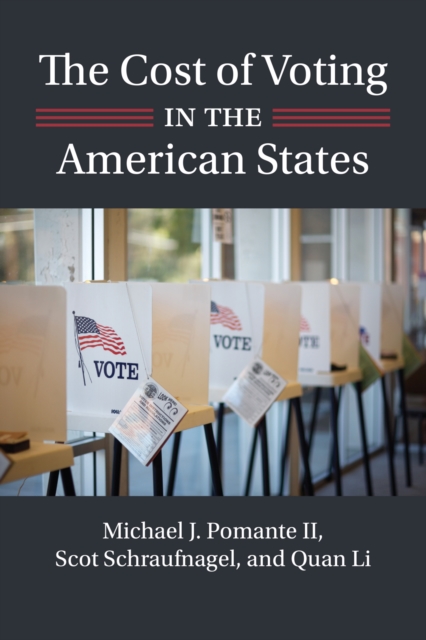The Cost of Voting in the American States

The Cost of Voting in the American States
In the wake of Shelby County v. Holder and the January 6 Capitol insurrection, changes to election laws, policies, and especially access to voting have become a key political battleground. A central point of contention is whether new restrictive voting laws intentionally discriminate against Black and Hispanic subpopulations in the United States. Conversely, do policies that expand voting access favor Democrats and increase the possibility of election fraud?
In The Cost of Voting in the American States, Michael J. Pomante II, Scot Schraufnagel, and Quan Li test these questions. The authors look specifically for systematic outcomes produced by distinctive election policies in the American states. First, they establish a competent measure of voting restrictions to begin this unraveling. The authors create a Cost of Voting Index (COVI) for the fifty states, which uses a statistical procedure to extract an underlying dimension and to determine significance from state laws based on how restrictive the polices are. The authors call the underlying dimension extracted the "cost of voting." With this measure in place, they evaluate which states have a higher cost of voting, how this cost impacts who votes, and whether there is a correlation between the cost of voting and minority populations.
Using Racial Threat Theory arguments, the authors demonstrate that states with larger or growing Black and Hispanic populations have more restricted voting, and that these restrictive voting laws disproportionately demobilize these populations in predictable ways. States with a higher cost of voting also show lower minority electoral success as well as a larger gap in Black and female representation, and the authors reveal that decreasing the cost of voting does not lead to fraud or favor one party over another. The Cost of Voting in the American States makes a case for a new preclearance formula, and the COVI provides a viable approach for future election law.
PRP: 278.69 Lei
Acesta este Prețul Recomandat de Producător. Prețul de vânzare al produsului este afișat mai jos.
222.95Lei
222.95Lei
278.69 LeiLivrare in 2-4 saptamani
Descrierea produsului
In the wake of Shelby County v. Holder and the January 6 Capitol insurrection, changes to election laws, policies, and especially access to voting have become a key political battleground. A central point of contention is whether new restrictive voting laws intentionally discriminate against Black and Hispanic subpopulations in the United States. Conversely, do policies that expand voting access favor Democrats and increase the possibility of election fraud?
In The Cost of Voting in the American States, Michael J. Pomante II, Scot Schraufnagel, and Quan Li test these questions. The authors look specifically for systematic outcomes produced by distinctive election policies in the American states. First, they establish a competent measure of voting restrictions to begin this unraveling. The authors create a Cost of Voting Index (COVI) for the fifty states, which uses a statistical procedure to extract an underlying dimension and to determine significance from state laws based on how restrictive the polices are. The authors call the underlying dimension extracted the "cost of voting." With this measure in place, they evaluate which states have a higher cost of voting, how this cost impacts who votes, and whether there is a correlation between the cost of voting and minority populations.
Using Racial Threat Theory arguments, the authors demonstrate that states with larger or growing Black and Hispanic populations have more restricted voting, and that these restrictive voting laws disproportionately demobilize these populations in predictable ways. States with a higher cost of voting also show lower minority electoral success as well as a larger gap in Black and female representation, and the authors reveal that decreasing the cost of voting does not lead to fraud or favor one party over another. The Cost of Voting in the American States makes a case for a new preclearance formula, and the COVI provides a viable approach for future election law.
Detaliile produsului









